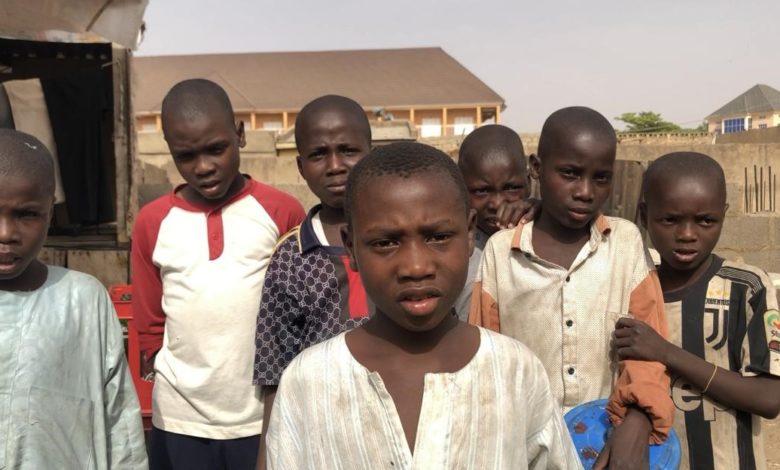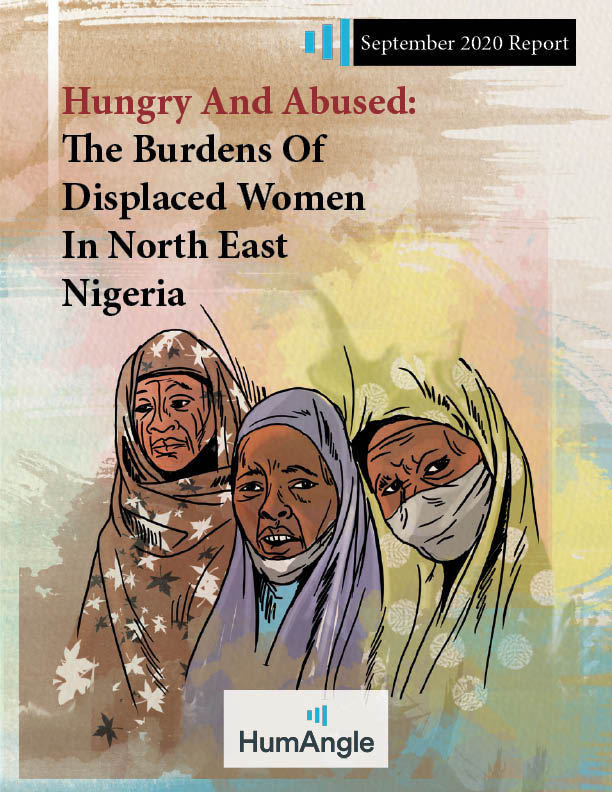COVID-19: Low Positive Cases Among Almajirai

Almajirai were seen at the heart of the COVID-19 pandemic in northern Nigeria at the onset of the disease outbreak in Nigeria. Their unhygienic lifestyles and frugal conditions provoke all types of communicable diseases, many feared.
Almajirai are scruffy-looking poverty-stricken young boys between the ages of four and 16 learning and memorising the Holy Quran in untidy and pathetic conditions.
Their crowded classes, which constitute teachers and neighbouring compounds, lack proper hygiene, sanitation facilities and contact among the populations are uncontrollable.
The impossibility of social distancing, the lack of water to regularly wash hands and the lack of awareness on how to protect themselves against COVID-19 were believed to be factors that could aid the transmission of the virus.
Faisal, an alamjiri, interviewed by HumAngle, said, “about 30 of us sleep under one roof,” which is normally very untidy, impoverished and less spacious dilapidated “soro” (entrance room).
The almajirai themselves were seen as a threat. If their youthful ages are less threatening to themselves, their movements to beg for what to eat was seen as an easy and simple transmission mechanism.
Leaders in northern Nigeria seized the opportunity, worked on the widely held fears and banned the alamjiri system.
State governments across northern Nigeria transported many of the children back to their parents in an attempt to curb the spread of COVID-19.
Low Positive Cases, No Death Recorded
Although the lack of testing among the almajirai could not give a clear picture of the actual positive cases of COVID-19 infection among the almajirai, the positive cases among them turned out very low and no single case of death was recorded.
As the identities of the people who died were not revealed due to some considerations, HumAngle went deeper to gather information from local sources so as to have a glimpse of the reality.
HumAngle was in Kano State, one of the states in northern Nigeria that experienced the upsurge of coronavirus cases, to investigate the mysterious and miraculous low number of cases among almajirai.
Although almajiri schools were officially banned in the state, HumAngle was able to trace few that continued to assemble small numbers of children who refused to be repatriated to their states of origin.
The most populous state had the highest number of almajirai in Nigeria and as of April, 2020, it had evacuated thousands of them to their states of origin while receiving some from other states.
Among the 1,860 quarantined in Kano State, 193 almajirai tested positive to COVID-19 with 86 positive cases confirmed in Gabasawa Quarantine camp, while 68 and 38 cases were recorded in Karaye and Kiru camps respectively.
Between May and June, the state experienced what was initially referred to as “mysterious deaths” but later turned out to be COVID-19 related deaths among elderly people.
In an interview with HumAngle, some teachers in almajiri schools said their students were in very good conditions and did not develop symptoms of COVID-19.
Mallam Ali Abubakar, a head teacher in Makarantar Mallam Ali in Gezawa Local Government Area, said none of his over 700 students reported being seriously sick in the past three months.
“I have over 700 almajirai; none of my almajirai has fallen sick for the past three months and no single case of death was recorded here,” he said.
Muhammadu Badamasi Abubakar, a head teacher at Makarantar Mallam Badamasi in Ja’en of Gwale Local Government Area, Kano State, echoed similar sentiment.
“Before coronavirus I had over 500 almajirai but currently I don’t know the exact number. I have two almajirai that had fever but no death was recorded,” Abubakar said.
Another head teacher, Mallam Shuaibu from Kumbotso Local Government Area, said he had about 200 almajirai and, for the past three months, only two cases of malaria were recorded in his school.
Not So Miraculous
Medical experts say while all children are capable of getting the virus that causes COVID-19, they do not become sick as often as adults but develop mild symptoms or no symptoms.
Almajirai are children of very young ages. They are tough and learn spartan life at a tender age. The children and many others who live with them believe a mild disease cannot take them down.
Adam Yusif Aikawa, the son of a popular almajiri teacher in Dala Local Government Area of Kano State, described the almajirai who lived in his house as boys with strong immunity.
People like Adam believe that almajirai might not be as severely affected by COVID-19 because their immunity was strong to resist the virus.
Continue reading …
Support Our Journalism
There are millions of ordinary people affected by conflict in Africa whose stories are missing in the mainstream media. HumAngle is determined to tell those challenging and under-reported stories, hoping that the people impacted by these conflicts will find the safety and security they deserve.
To ensure that we continue to provide public service coverage, we have a small favour to ask you. We want you to be part of our journalistic endeavour by contributing a token to us.
Your donation will further promote a robust, free, and independent media.
Donate HereStay Closer To The Stories That Matter





